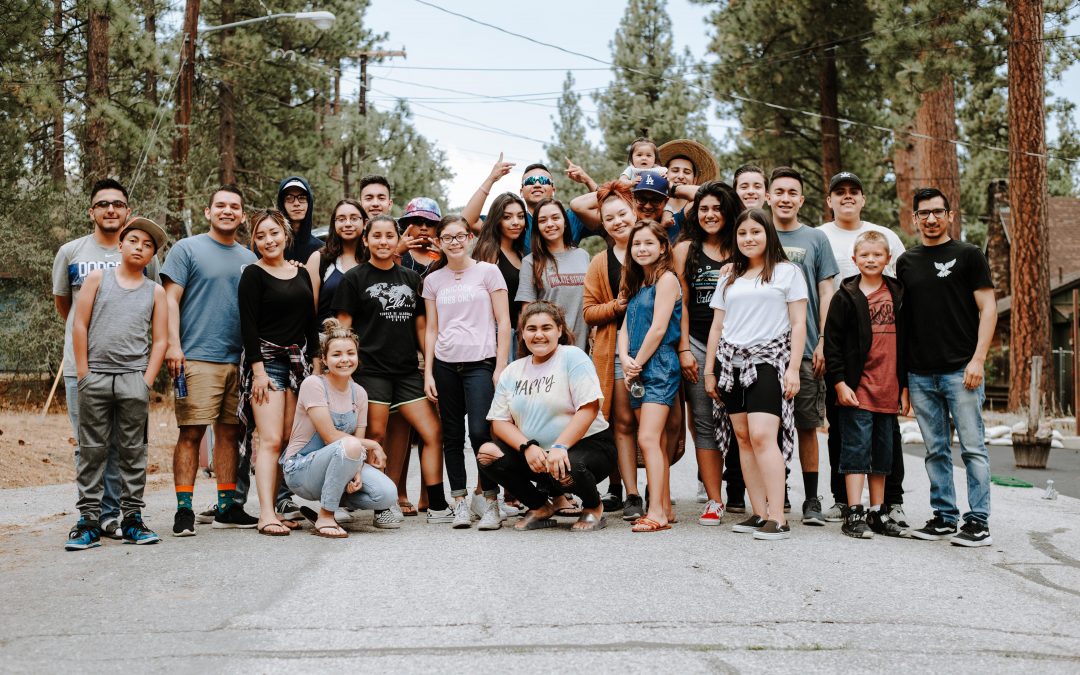
Mumbach
It turns out that my mum and Daniel Holbach are very different people. I doubt that my mum is deft at bustin’ out Balkan Beats. Daniel Holbach probably never saw me naked when I was two. I am fairly confident that mum is not familiar with `dpkg`, and I am certain that Daniel does not love my dad.
They do though have one important thing in common. Today is their birthday!! Woo!
With such an important day before us, I just wanted to share a few words about each of them.
Lets start with my mum. OK, let me cut to the chase: I love my mum. A while back [I wrote about how proud I am of my dad](https://archivedblog.jonobacon.com/2008/07/01/mum-and-dad/). Fortunately I have also been blessed with mum that fills me with pride and joy too. A remarkable woman with a heart of gold and a wicked sense of humour, her selfless persona always puts her family and friends first. Not only this, but she is the perfect companion to my dad. 29 years after they tied the knot they are still hopelessly in love. Having recently got married, they are my inspiration to provide my family with the kind of love and support that I received. Over the years my mum has taught me many things, but of all, I have sought to take her light-hearted approach to life and an always present conciousness of remembering who you are and where you came from. Happy birthday mum, I love you. 🙂
Now to Mr Holbach. I first got to really know Daniel when he joined my team at Canonical. Since then not only has he become a great colleague, but a real brother too. Daniel has the attributes that I really admire in person: he is a passionate, funny and entirely down to earth. He always a sense of fun, a sense of excitement and at times, a strangely British sense of sarcasm. That actually caught me of guard when I first got to know him: his German undertones perfectly masked his natural talent as a sarky bugger. 🙂 You know what, I love my job, and a big reason is that I get to work with such a great team: Daniel brings so much to it. Happy birthday pal, have a great day, and I look forward to catching up with you soon. 🙂
What a great day: a day that celebrates two great people. 🙂

Dutch LoCo Bringing It Home
Just wanted to share a little story about the [Dutch Ubuntu LoCo Team](https://www.ubuntu-nl.org/).
A while back I had an email from Jan Stedehouder about asking for help with a Dutch computer fair, the HCC dagen. Jan was attending to advocate Ubuntu and spread the word like the rock star that he is. I arranged to send the Dutch LoCo 400 Ubuntu CDs and it was a roaring success: the team not only kicked arse, but took names too. Jan informed me that all the CDs were gone in a few hours.
Jan and the team explained Linux to visitors of the stand, identifying the nuances of our ethos and benefits we have baked into Ubuntu. Aside from the buzz of sharing Ubuntu, Jan and co were also inspired by the diversity of their audience:
> “It was good to see people of all ages and nationalities, constantly flocking the various computers with Ubuntu”.
Great work folks! Everyone should give the Dutch LoCo a quick hi-five via the Internet.
I was personally ticked pink that Jan used [The Ubuntu Ethos](https://archivedblog.jonobacon.com/2008/12/19/the-ubuntu-ethos/) to ask his audience in his presentation to share their own ethos. I can feel the Ubuntu ethos growing. It is fantastic to see LoCo teams driving this ethos forward.
Jan also shared with me how Ubuntu is rocking in Holland. He has just released his first book “*Probleemloos overstappen op Linux*” (Migrating without problems to Linux). This book is based on Ubuntu 8.04. A second book is also released in a few days and called “*Basiscursus Ubuntu*” (Ubuntu Basics course). This book targets average Windows users who want to try out Ubuntu. Jan tells me it is a pretty straight-forward, step-by-step introduction on how to install Ubuntu, add software and users, fine tune hardware and deal with administrative tasks.
Great work, folks!
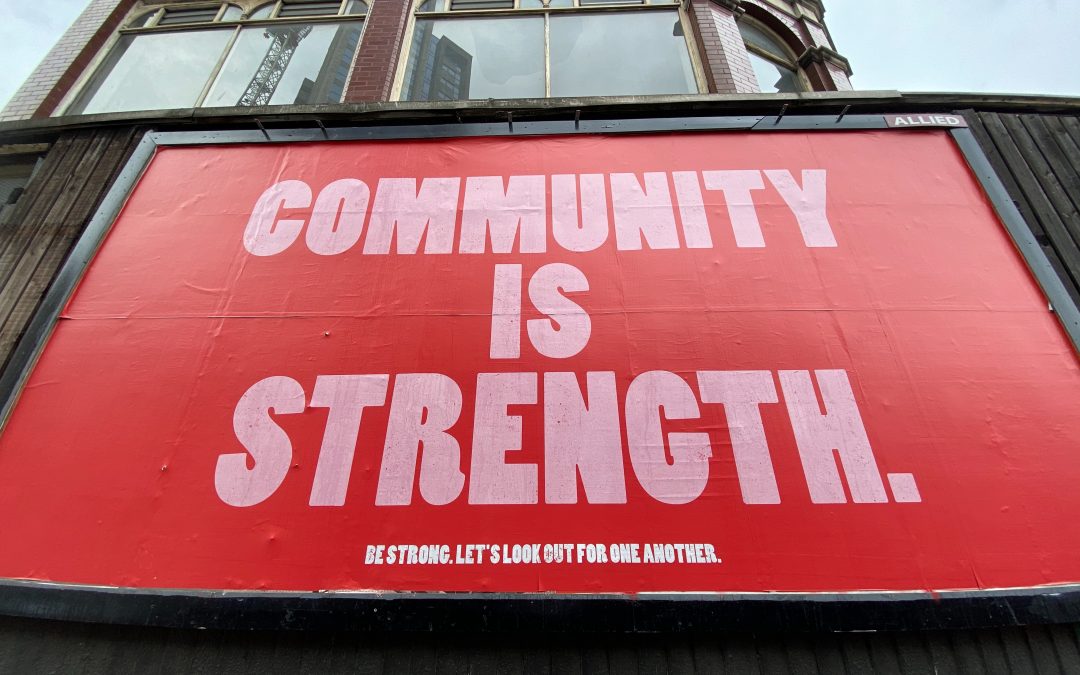
The Art Of Community
Today I am proud as punch to announce the [Art Of Community](https://www.artofcommunityonline.org/).
A while back I was approached by [Andy Oram](https://www.artofcommunityonline.org/about-the-editors/), a senior editor at [O’Reilly](https://www.oreilly.com/) to write a definitive book about how to grow, build and energise a community. This book will be called the *Art Of Community*.
The book covers a wide range of topics designed to build strong community. This includes the structure and social economy behind community, building effective and easy to use infrastructure, setting up community processes, creating buzz and excitement, governance, conflict resolution, scalability and more.
This book is much more than merely a textbook on building a compelling community. I believe that we learn how to build strong community through the exchange of stories and experiences. We all have great insight into community. These stories are illustrative vessels for important lessons and subtleties in how great communities work. The *Art Of Community* is a compendium of stories, anecdotes and experiences inside and outside the Open Source world. These stories illustrate the many concepts scattered throughout the book, and many of these stories will include some of you reading this and your projects.
I am currently part-way through the writing process, and we have an expected release date this summer.
The release of *Art Of Community* is actually rather exciting. The book will be available in two forms.
* Firstly, there will be a normal printed copy available to buy. This will be available from the usual places you can buy O’Reilly books.
* Secondly, The book will also be available under a [Creative Commons Attribution-Noncommercial-Share Alike](https://creativecommons.org/licenses/by-nc-sa/3.0/) license. This provides everyone with the opportunity to share, modify and re-use the content.
O’Reilly has my utmost respect for embracing the Creative Commons. This is a great opportunity for O’Reilly, Creative Commons content and community building.
In addition to the announcement, I am also pleased to announce a website devoted to the book over at [www.artofcommunityonline.org](https://www.artofcommunityonline.org/).
The website will feature updates, sneak peeks of the content, profiles of the topics and stories in the book, profiles of the editors and proof readers and more. I am really keen to hear your stories and experiences, and there will be plenty of opportunities to get involved in the discussion. Also, when we release the book, the top ten posters with the most number of comments on the articles there will get a free signed printed copy of the book.
So, exciting times. Lots of work, but exciting times nonetheless. Lets get rolling…
[DIGG](https://digg.com/linux_unix/The_Art_Of_Community)

Announcement

Wednesday 14th January 2009 @ [jonobacon.com](https://archivedblog.jonobacon.com/)
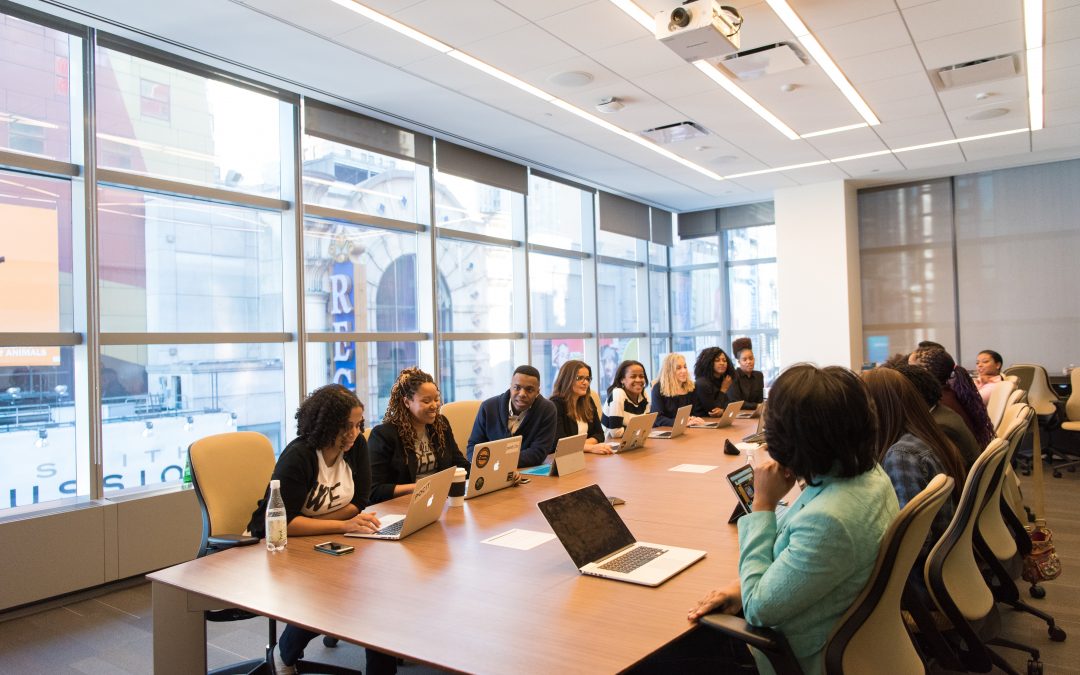
Winning Formula

I just want to say a big *well done!* to our friends in the [Ubuntu Forums](https://ubuntuforums.org/) for bagging the *Best Support Resource* in the [Linux Format](https://www.linuxformat.co.uk/) awards in issue LXF115. The forums community managed to beat the mighty Google. Pretty impressive stuff!
All of us in the Ubuntu community are so proud of the excellent work that goes on in the Ubuntu Forums. 6.5million posts and counting, 745,000 members and growing…the forums are a hugely valuable resource for Ubuntu and the Ubuntu ethos. They provide an important home for many of our community members. Thank you to Forums Council, the moderators and all the posters for earning the award. 🙂
I am also hugely proud to see that [Ubuntu](https://www.ubuntu.com/) won the *Best Distribution Award* and [Canonical](https://www.canonical.com/) bagged the *Best Enterprise Award*. Props also to the [KDE](https://www.kde.org/) team for rightly deserving the *Free Software Project Of The Year* award for their incredible work on KDE4. 🙂
What a great start to the year. Lets make 2009 really kick it. 🙂

You Don’t See This Very Often…
Something I discovered while looking at the [Bolt Thrower](https://www.boltthrower.com/) website a little while back. I had to share it:
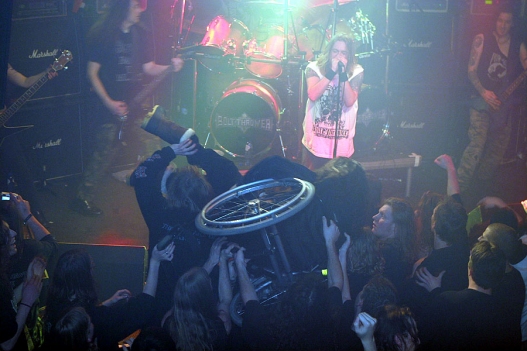
All I can say is “Wow”.

Good People. Great Teams.
A while back I [asked you to all re-connect with the Ubuntu ethos](https://archivedblog.jonobacon.com/2008/12/19/the-ubuntu-ethos/). I asked for your stories of how you define your Ubuntu ethos, and there were some wonderful responses. Thank you everyone.
Ethos is important. Critical in fact. It is the glue that will bind us through the turbulent years ahead as we continue to grow and step up to the status quo, demanding change. We are going to face all manner of challenges in the coming months: both technical and social. The competition are going to be on our case almost constantly, but we will be there at every step of the way to nail our colours to the board. Ubuntu has made huge progress in recent years. We have managed to capture some *real* mindshare. We now need to get out there finish the job.
The next level of the game is going to require many skills. Diversity is going to be the key to us flourishing. We are going to need great packaging, software development and bug-fixing. We are going to need rocking documentation and translations, more and more testing and lots of feedback. We will need training, we need to support our new and existing users, and we need to focus our energy positively. On one hand diversity can be read as the things that make us different. On the other hand it can be read as the many different varieties of arse that we are going to kick in the coming year, united in our shared ethos.
Ubuntu is all about people. In response to my post on ethos, regular jb@h poster ethana2 summarised his vision of Ubuntu as “*I am what Ubuntu means to me. I don’t just use it, I contribute to it, I personalize it, I spread it, I support it*”. He hit the nail on the head. Ubuntu, and the wider Open Source and Free Software ethos is all about people working together, uniting behind an opportunity to make their own world better. Fortunately making your own world better often means making someone else’s world better too.
The way we are going to win is to enable good people to do great work. Good people is what drives our community forward. Daviey Walker touched on this in [his response](https://blog.daviey.com/ubuntu/its-all-about-the-community-baby.html):
> Why is the community full of ‘good’ people?
> Does Ubuntu only attract ‘good’ people?
> Is there, in actual fact, good in everyone?
> Does Ubuntu bring out the ‘good’ in everybody?
> Do only ‘good’ people want to get involved in the community?
There are many, many examples of good people and great stories in our community. One really touched me recently.
In response to my [last post about open learning](https://archivedblog.jonobacon.com/2009/01/06/open-source-and-open-learning/), Dan Trevino from the Florida LoCo shared a story about some of the excellent work that they are doing with an organisation called [QuinnCo Inc](https://www.quinncoincorporated.org/):
> One formerly active member started [Free Geek Central Florida](https://www.freegeekcentralflorida.org/), and just recently, a new loco member started QuinnCo Inc. Free Geek needs no introduction, but QuinnCo might. In their own words:
> “Our goal is to provide special computers to kids with special needs. We take donated computers and load them up with free education games that teach kids computer skills, literacy skills, and math skills”.
The customised Operating System that QuinnCo are working on is based on [Xubuntu](https://www.xubuntu.org/).
A strong computing foundation in Xubuntu and a strong local community foundation in the Florida LoCo team is a compelling combination; a combination that is making life better for kids with special needs in Florida. In my mind this gets to the very heart of the opportunity of Open Source: making life better for people. Keep up the great work folks, we are all behind you!
[LoCo Teams](https://wiki.ubuntu.com/LoCoTeams]) are responsible for so many of these great stories. It is LoCo Teams that are on the ground talking to potential users, giving out CDs, talking to local businesses and charities and more. They are a huge asset to Ubuntu. We have hundreds of teams around the world doing incredible work, spreading the message of Ubuntu far and wide. They themselves exhibit the very ethos that we are sharing with others.
I am keen to know more of these stories. I would like to ask each of you in a LoCo Team to share a story on your blog or in the comments below. I would like to begin building a compendium of example stories that showcases the kind of excellent work that LoCos are doing. This is the first step in getting our LoCo Teams better coordinated, sharing experience and advice, changing the world one user at a time. I look forward to hearing from you all. 🙂

Open Source and Open Learning
Years ago when I was at [OpenAdvantage](https://www.openadvantage.org/), I worked closely with a group called Access To Recycled Technology. Formed by two salt-of-the-earth students called Steve and Vinnie, they secured what they referred to as “access space” in Birmingham. It was basically a decent sized room that they used to fill with old, discarded computers. They would then install Linux on these computers and use them to train people and upskill them in Open Source software and general computing skills. Linux was the perfect choice: it ran well on older hardware, and software such as XFCE managed to squeeze more juice out of those machines.
For many of the people who came to access space, Steve and Vinnie would furnish them with a computer that they could take home to continue to learn and refine their skills. The guys had struck a deal with Birmingham City Council to take a warehouse full of old computers that were destined for the dump. This gave them a stock of computers to give out to the local community, complete with Linux and application software pre-installed. It was perfect for all involved: for the council to dispose of the computers in landfill was expensive, so when Steve and Vinnie came knocking, it was ideal.
I loved the concept of the scheme. It fits the opportunity of Open Source perfectly: old computers re-energised with free software to give away to people who need them. It helps put computers in the hands of people who could not ordinarily afford them, helps encourage learning, and contributes to closing the digital divide. It is also an ideal green-friendly way to deal with the mounds and mounds of computers that are simply not cut-out for Vista.
The opportunity for Open Source in this area is stunning. While at OpenAdvantage I worked with Birmingham City Council to fill a Community Center in Aston (a deprived part of Birmingham) with machines that ran Ubuntu to help train the local community. Courses were given in using the desktop, office productivity, graphics with the GIMP and Blender, web development in HTML and PHP, learning and sharing knowledge with Wikipedia, desktop publishing with Scribus and more. We also worked with the center to run courses designed to excite local young people. Courses were run on podcasting, recording music, editing video and more. The courses helped to get kids off the street and in a computer room, being creative and enjoying the technology. It was great to see their faces when they realised they could take the software home and use it there too, and that they could share it as much as they liked.
Open Source really paves the way to learning. I have met so many people who have had a hugely positive impact on their lives by enabling their creativity with Open Source.
An example of this was a kid known as [WeirdHat](https://www.weirdhat.com/). Years ago he used Blender to composite him fighting an animated character in lightsaber battle (unfortunately I can’t find the original video to share with you all). He then entered Theforce.net’s fanfilm forum with [this video](https://www.weirdhat.com/blender/clonefight.mov) of him having a lightsaber battle with *himself*. It is stunning. Not only that, but he then went on to [animate Colbert with a lightsaber](https://www.blendernation.com/2006/08/25/weirdhats-blender-work-on-colbertnation/) and got featured on the show. He used Blender for it all.
WeirdHat is obviously a talented guy. The free availability of Blender and a stunning community of Blender users helped unlock his creativity. There are thousands of similar stories happening right now: Open Source opening up doors to creativity which are not only rewarding, but career building. Do you folks have any other success stories to share?
But lets get back to the concept of using Linux to recycle computers. While there are many of these schemes around the world, it seems that they are largely uncoordinated. It strikes me that there is oodles of potential in getting these different projects together to share knowledge, best practice and advice. There is also huge potential in working with other user groups such as Ubuntu LoCo Teams and Linux User Groups to help staff the projects, deliver training and install the software on computers.
Speaking personally, I would love to see our worldwide collection of [Ubuntu LoCo Teams](https://wiki.ubuntu.com/LoCoTeamList) help to deliver Ubuntu or its derivatives to people on these computers. Are any LoCo teams doing this? If we have a small number of teams doing this, lets get them talking together and see what opportunities flow from it.

DJ Westby In The Hall
I am pleased to announce that James Westby is the new [Featured Contributor on the Ubuntu Hall Of Fame](https://hall-of-fame.ubuntu.com/).
We already knew that James rocked the house with his Ubuntu work, but the new *Nominate somebody!* feature in the Hall Of Fame generated a number of requests for James. So, it seemed only right that DJ Westby got the first prestigious Featured Contributor slot of 2009. Congrats James!
Make sure you all head over to the Hall Of Fame and click on the *Thank James* button!
We want to know which contributors you think are rocking the (K)(X)(N)(U)(Flux)buntu(Studio) (etc.) landscape. Its easy:
* Go to the [Hall Of Fame](https://hall-of-fame.ubuntu.com/) website.
* Click the *Nominate somebody!* link.
* Enter the URL of the person’s Launchpad profile and a few notes on why they should be a Featured Contributor.
Easy!

I Invented Twitter
Well kind of…in a way…possibly…OK, not at all.
The other day I was digging through some old articles that I wrote. To my amusement, I saw a reference to a little program I hacked up once when I was involved as a KDE developer. I had totally forgotten about it, and I figured it would be fun to share the story.
Back in the year 2000 when I was starting University, I spent every evening between midnight and 6am hacking on code. Fuelled by six cans of coke every night, I barely slept for those few years: I was running on three or four hours of sleep for most nights. Every evening I was excited to fire up my concrete brick of a laptop, check out the latest KDE CVS and taste the latest crack of the day. This inspired me to want to contribute to the project in some way.
It was a bit of a trial by fire. I was not only learning C++ but also Qt and the KDE bindings. To be frank, I was not very good. But I tried hard, I learned a lot, and mostly importantly, I had a lot of fun.
Throughout this time I wrote a bunch of little programs. One of these programs was called KWebStat, and this what I re-read about the other day. Using the wonder of the [Wayback Machine](https://www.archive.org/index.php) I managed to find the [old homepage](https://web.archive.org/web/20021111140233/https://www.jonobacon.co.uk/kwebstat/) for it which included a screenshot:
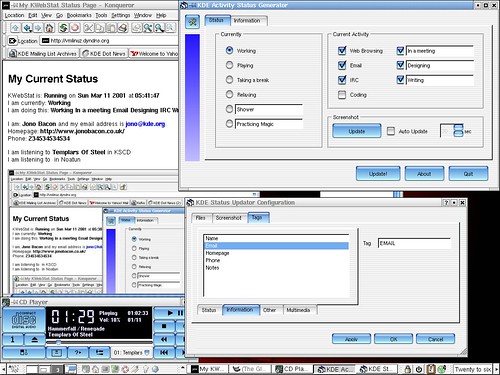
*[See a bigger screenshot](https://flickr.com/photos/jonobacon/3169820622/sizes/o/)*
When I read the article, I realised the program was a simple, primitive equivalent to what we now know as Twitter: it put a current status update online. KWebStat was a little different: instead of writing a message, you could click some buttons to indicate what you were doing at that moment, and you could set custom activities to show. KWebStat was a lot more primitive than Twitter though: it updated a static HTML page and you needed some magic to get that page online, but the basic premise was there. There were a few niceties though: KWebStat could grab which song you were listening to in your CD or music player as well as grab a screenshot and put that online. It was a pretty primitive first implementation of status-blogging, and I used it on my old homepage.
So, if the Twitter folks would kindly send over a portion of that mountain of gold that they have, it would be appreciated.
Hugs, Jono.
